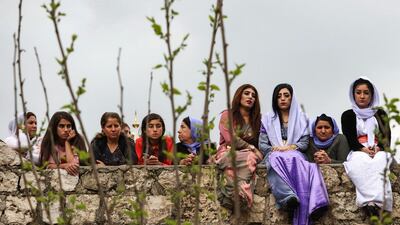Yazidi leaders in Iraq announced on Wednesday they would accept into their community children born of Yazidi women and the ISIS members who enslaved them.
It was a landmark decision for the religious minority which has historically rejected mixed marriages and children fathered by outsiders.
ISIS attacked the Yazidi when they overran the group's heartland of Sinjar in northern Iraq in 2014.
Thousands of Yazidis were killed and young women were enslaved to serve as concubines for fighters. The UN described the onslaught as an ISIS genocide campaign.
Baghdad declared victory against the insurgents in 2017 but thousands of Yazidi members are still missing and most of the community is still displaced.
Until now the women have been welcomed back but not their children, leaving mothers choose between staying in Syria with their children or abandoning them to return home.
Across the Middle East, rape can bring stigma to its victims. The Yazidi community, which has faced generations of persecution, has guarded its membership tightly as a means of preservation.
But the Yazidi Supreme Spiritual Council said it would make an exception for those held by ISIS.
"The council has sent Yazidi clerics to Syria to follow up on the issue and to bring all the survivors home," it said. "We have accepted that what happened to them was out of their control.
"The Yazidis were throughout history victims of crime and we treat survivors with pride, humanity and transparency."
The decision was a momentous one for the insular religious minority.
“It is important to understand that this is a stretch for the basis of Yazidi faith, where the religion is passed through bloodline of both parents," said Murad Ismael, executive director of global Yazidi organisation Yazda.
The community, which has no supreme written text, has developed its norms incrementally.
In 2015, Yazidi spiritual leader Babashekh Khirto Hadji Ismail said that kidnapped women would be welcomed back, and considered pure.
Before that, women who were no longer virgins would not be able to marry within the faith.
The issue of children born to kidnapped Yazidi women has been a top priority for international organisations, said Faris Keti, who was an adviser to the late Yazidi leader Prince Tahseen.
"The government and the international community need to play significant roles to solve the legal and social issues [that will follow this decision] in addition to providing the necessary support through rehabilitation programmes," Mr Keti told The National.
The social stigma these children will eventually have to deal with will be out of the council's power, he said.
This month, Iraqi President Barham Salih sent a draft bill to Parliament which, if passed, would classify atrocities committed by ISIS against Yazidi women as “genocide”.
“The draft bill presented to Parliament guarantees the rights of female Yazidi survivors of ISIS," the preident's office tweeted.
"It proposes they get monthly allowance, rehabilitation and are ensured a dignified life."
The draft law stipulates that priority will be given the Yazidi women who want to work for the government.
It also aims to recognise the 2014 events as a genocide and to declare August 3, the day on which ISIS attacked Sinjar, as a national holiday.
Followers of the faith have sought to preserve its identity among Iraq’s mainly Muslim population. Traditionally they have kept their community closed off and their rituals little known.
Nadia Murad, a Yazidi woman who escaped ISIS captivity and won the Nobel Peace Prize last year for her activism against sexual violence, took part in the discussion of the draft bill with Mr Salih.
Ms Murad was one of an estimated 3,000 Yazidi women and girls who were kidnapped and sold into sexual slavery.


